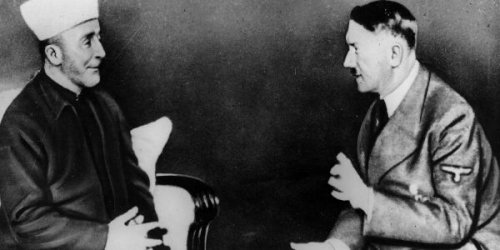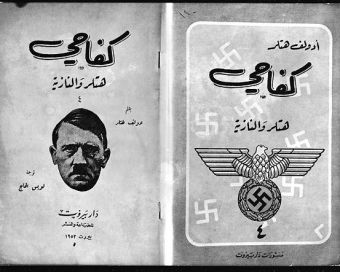Hate Radio
The long, toxic afterlife of Nazi propaganda in the Arab world
–
By Jeffrey Herf
Published in The Chronicle of Higher Education; november 22, 2009
Between 1939 and 1945, shortwave radio transmitters near Berlin broadcast Nazi propaganda in many languages around the world, including Arabic throughout the Middle East and North Africa, and Persian programs in Iran. English-language transcripts of the Arabic broadcasts shed light on a particularly dark chapter in the globalization of pernicious ideas. The transcripts’ significance, however, is not purely historical. Since September 11, 2001, scholars have debated the lineages, similarities, and differences between Nazi anti-Semitism and the anti-Semitism of Islamic extremists. These radio broadcasts suggest that Nazi Arabic-language propaganda helped introduce radical anti-Semitism into the Middle East, where it found common ground with anti-Jewish currents in Islam.
In a 2007 book, Jihad and Jew-Hatred: Islamism, Nazism and the Roots of 9/11 (Telos Press), the German political scientist Matthias Kuentzel details how Nazi ideology influenced Islamist ideologues like Hassan al-Banna and Sayyid Qutb of the Muslim Brotherhood in Egypt, as well as the Palestinian leader Haj Amin al-Husseini. More recent examples abound. The founding charter of Hamas, the militant Palestinian group, recapitulates conspiracy theories about Jews that were popular in Europe in the 20th century. Al Qaeda’s war against “the Zionist-Crusader Alliance” and the anti-Zionist rants of President Mahmoud Ahmadinejad of Iran also display a blend of anti-Semitic themes rooted in Nazi and fascist, as well as Islamist, traditions. To be sure, each of these movements and ideologies have non-European, local, and regional causes and inspirations. But the formulation of Nazi propaganda during World War II and its dissemination stand as a decisive episode in the development of radical Islamism.
After Hitler invaded Poland in September 1939, German embassies and consulates were closed throughout North Africa and the Middle East, hampering Nazi propaganda efforts. Between 1941 and 1943, as German forces were engaged in heavy fighting in North Africa, millions of leaflets were dropped from airplanes and distributed on the ground by propaganda units operating with Rommel’s Afrika Korps. But in a region where fewer than 20 percent of adults were literate, radio was considered a much more effective medium of communication. Radio stations like Radio Berlin and the Voice of Free Arabism adapted Nazi propaganda to the circumstances of the Middle East.
Only a fraction of the Nazi regime’s broadcasts in Arabic survived the war in the German archives. But in the fall of 1941, the American Embassy in Egypt began to produce verbatim English-language translations of Nazi broadcasts. Every week for the remainder of the war, the embassy sent a digest, “Axis Broadcasts in Arabic,” to the secretary of state in Washington. In the parlance of contemporary intelligence operations, “Axis Broadcasts in Arabic” would be described as “open source” intelligence gathering, that is, an examination of what adversaries say in public. As far as I have been able to determine, “Axis Broadcasts in Arabic” comprise the most complete record of Nazi Germany’s efforts to win the hearts and minds of the Arab and Islamic world.
That task was made more difficult because of ideas about Aryan racial superiority and purity that were central to Nazi ideology. Nazi diplomats had long been sensitive to the fact that such views made it difficult to garner Arab allies. Before the war, German officials went to great lengths to reassure Arabs that Nazi policies, like the Nuremberg Race Laws of 1935, were aimed strictly at Jews, not non-Jewish Semites. In addition, Arab leaders were given private assurances that the Third Reich opposed British and French colonialism, as well as Zionist aspirations in Palestine. But Mussolini’s imperial ambitions around the Mediterranean remained at odds with an open declaration of support by the Axis powers for Arab independence. By the summer of 1942, however, when Hitler and Mussolini believed that they were on the verge of victory over the Allies in North Africa, the two leaders publicly called for an end to colonialism in the region. And for the remainder of the war, Nazi radio broadcast an unrelenting flood of anti-British, anti-American, anti-Soviet, and especially anti-Jewish propaganda into the Middle East. It was hate radio with a vengeance.
The Nazi Arabic-language broadcasts were the result of a collaboration between officials in the German foreign ministry and pro-Nazi Arab exiles who found refuge from the British in Berlin, most notably Haj Amin al-Husseini, the Grand Mufti of Jerusalem and the most important Palestinian religious and political figure of the era, and Rashid Ali al-Kilani, leader of a pro-Axis coup in Iraq in 1941, which was quickly reversed by the British military. Husseini’s and Kilani’s arrival in Berlin in 1941 provided the Axis with a rare asset: Arabs who could communicate Nazi ideas in colloquial, fluent, and passionate Arabic. Previously, the Arabic broadcasts drew on the expertise of German Orientalists and the local knowledge of German diplomats who had served in the Middle East.
Those early broadcasts tended to present the Third Reich as an ally of both Arab nationalists and Muslim fundamentalists. Speeches by Hitler or Joseph Goebbels, his propaganda minister, were generally omitted. Instead, the programs combined commentary on political events in the Middle East with a selective appropriation and interpretation of the Koran. The broadcasts began with an incantation—”Oh Muslims”—and a call for listeners to return to the words of the Koran. During the winter of 1940-41, several broadcasts described Muslims as “backward” because they had “not shown God the proper piety and do not fear him.” A return to traditional Islam, the broadcasts suggested, would lead to victory over Islam’s enemies.
This appeal is indicative of the reactionary modernist character of Nazi propaganda, which combined modern technology with calls to reject modern liberal democratic values and institutions. The early Arabic-language broadcasts created the perception of affinity between Nazi ideology and the Koran.
Following the arrival of Husseini and Kilani in Berlin, the broadcasts more skillfully integrated the Nazi perspective on World War II with themes of Arab nationalism, as well as rhetoric that we would now call fundamentalist or radical Islamic. On July 3, 1942, as Rommel’s Afrika Korps advanced toward El ‘Alamein, about 60 miles west of Alexandria, Egypt, a station called Berlin in Arabic announced that German and Italian forces were coming to “guarantee Egypt’s independence and sovereignty,” and “to liberate the whole of the Near East from the British yoke.” Husseini, who came on the air to celebrate Rommel’s “glorious victory,” declared that “the Axis powers are fighting against the common enemy, namely the British and the Jews.”
In Germany, Nazi propaganda routinely blamed the Jews for starting World War II. Hitler, for instance, famously boasted that the war would result not in “the extermination of the Aryan race but rather the extermination of the Jewish race in Europe.” In broadcasts to the Middle East, the Nazis repeated that claim, arguing that Britain and the United States were stooges of the Jews. An Allied victory, the Nazis warned, would mean Jewish domination of the Arab world and the success of Zionism. Germans were reassured by the regime that the process of “fulfilling Hitler’s prophecy”—to exterminate and annihilate the Jews—was under way. In broadcasts to the Middle East, listeners were called upon to participate in the massacre.
At 8:15 p.m. on July 7, 1942, the Voice of Free Arabism played a remarkable program titled, “Kill the Jews Before They Kill You.” The broadcast began with a lie: “A large number of Jews residing in Egypt and a number of Poles, Greeks, Armenians, and Free French have been issued with revolvers and ammunition” to fight “against the Egyptians at the last moment, when Britain is forced to evacuate Egypt.” The broadcast continued:
“In the face of this barbaric procedure by the British we think it best, if the life of the Egyptian nation is to be saved, that the Egyptians rise as one man to kill the Jews before they have a chance of betraying the Egyptian people. It is the duty of the Egyptians to annihilate the Jews and to destroy their property. … You must kill the Jews, before they open fire on you. Kill the Jews, who have appropriated your wealth and who are plotting against your security. Arabs of Syria, Iraq, and Palestine, what are you waiting for? The Jews are planning to violate your women, to kill your children and to destroy you. According to the Muslim religion, the defense of your life is a duty which can only be fulfilled by annihilating the Jews. This is your best opportunity to get rid of this dirty race, which has usurped your rights and brought misfortune and destruction on your countries. Kill the Jews, burn their property, destroy their stores, annihilate these base supporters of British imperialism. Your sole hope of salvation lies in annihilating the Jews before they annihilate you.”
This broadcast, which combined secular political accusations with an appeal to the religious demands of Islam, was unusual only insofar as it explicitly voiced genocidal intentions that were merely implicit in other declarations about the venality and power of the Jews. Two German historians, Klaus-Michael Mallmann and Martin Cüppers, recently uncovered evidence that German intelligence agents were reporting back to Berlin that if Rommel succeeded in reaching Cairo and Palestine, the Axis powers could count on support from some elements in the Egyptian officer corps as well as the Muslim Brotherhood. Mallmann and Cüppers also show that an SS division was preparing to fly to Egypt to extend the Final Solution to the Middle East. The British and Australian defeat of Rommel at the Battle of El ‘Alamein prevented that from happening.
How was Nazi propaganda received by Arabs and Muslims in the Middle East? Research into this question has begun, but much more remains to be done by scholars who read Arabic and Persian. It is clear, as Meir Litvak and Esther Webman point out in their important new book, From Empathy to Denial: Arab Responses to the Holocaust (Columbia University Press), that the revulsion for fascism and Nazism that greatly influenced postwar politics in Europe was not nearly as prevalent in the Middle East. In a June 1945 report, the Office of Strategic Services, the precursor to the Central Intelligence Agency, determined that “in the Near East the popular attitude toward the trial of war criminals is one of apathy. As a result of the general Near Eastern feeling of hostility to the imperialism of certain of the Allied powers, there is a tendency to sympathize with rather than condemn those who have aided the Axis.” The OSS concluded that there was no support in the region for bringing pro-Axis Arab leaders like Husseini and Kilani to trial.
In the first months after the war, as the scope of the Jewish catastrophe in Europe was being revealed, Arab and Islamic radicals showed no sign of reconsidering their hostility to Zionism. On June 1, 1946, the OSS office in Cairo sent a report to Washington about a statement made by Hassan Al-Banna to the Arab League on the occasion of Husseini’s return to Egypt. Banna, the leader of the Muslim Brotherhood, celebrated Husseini as a “hero who challenged an empire and fought Zionism, with the help of Hitler and Germany. Germany and Hitler are gone, but Amin Al-Husseini will continue the struggle. … There must be a divine purpose behind the preservation of the life of this man, namely the defeat of Zionism. Amin! March on! God is with you! We are behind you! We are willing to sacrifice our necks for the cause. To death! Forward March.”
Banna’s hope that Husseini would “continue the struggle” indicates that Banna perceived the battle against Zionism as a continuation of Nazism’s assault on the Jews. Sayyid Qutb, another extremely influential member of the Brotherhood, incorporated anti-Jewish ideas from Europe to forge a new jihadist ideology. In his essay from the early 1950s, “Our Struggle With the Jews,” which became central in the canon of radical Islamist texts—the essay was republished in 1970 and distributed throughout the world by the monarchy in Saudi Arabia—Qutb argued that Jews are implacable enemies of Islam. As such, Qutb wrote, Jews merited “the worst kind of punishment.” Qutb claimed that Allah had sent Hitler to earth to “punish” the Jews for their evil deeds. In so doing, Qutb justified, rather than denied, the Holocaust. This paranoid analysis, in turn, influenced the authors of the charter of Hamas, which blends Islamist fundamentalism with the Nazi ideology of mid-20th century Europe. The Hamas Charter holds Jews responsible for the French and the Russian Revolutions, World War I and World War II, as well as the founding of the United Nations—all of which were, Hamas argues, orchestrated for the purpose of furthering Jewish world domination.
Many decades and events stand between World War II and contemporary expressions of radical Islam. Yet the transcripts of Arabic-language propaganda broadcasts offer compelling evidence of a political and ideological meeting of minds between Nazism and radical Islam. The toxic mixture of religious and secular themes forged in Nazi-era Berlin, and disseminated to the Middle East, continues to shape the extreme politics of that region.
—
You may also want to read an article by Richard Wolin, Herf’s misuses of history, in which he tries to counter the findings of Jeffrey Herf’s book (Nazi Propaganda for the Arab World).
In addition please take notice of ‘Islamo-Fascism’: an Exchange; an online debate between Jeffrey Herf and Richard Wolin about this subject.
About the Author:
Jeffrey Herf is a professor of modern European and German history at the University of Maryland at College Park and author of The Jewish Enemy: Nazi Propaganda During World War II and the Holocaust (Harvard University Press, 2006). His latest book is Nazi Propaganda for the Arab World, published this month by Yale University Press.
Mazzeltov,
Crethi Plethi



 RSS
RSS














New article #crethiplethi.com about Nazi propaganda in #Islam http://bit.ly/73BXoi
[…] link: How Nazi Propaganda influenced Radical and Political Islam Share and […]
[…] artikelen in het engels: How Nazi Propaganda influenced Radical and Political Islam; en Muslim Arab Antisemitism today […]
[…] How Nazi Propaganda influenced Radical and Political Islam […]
Very interesting, all these informations should be published in many languages and above all, in Arabic
[…] the Farhud was a Nazi riot. The Farhud was the result of the work of the Grand Mufti of Jerusalem Haj Amin el Husseini. The Mufti cut a deal with the Nazis to overthrow the British-sponsored government of Iraq and […]
The word ‘islamism’ doesn’t exist, why do narrow minded people like you exist? [comment edited… please read the comment rules]
Hitler hated the Muslims and the Arabs, thus your whole argument is bullshit.
He wanted white extremists to rule.
@John
The free dictionary:
Merriam-Webster:
Wikipedia: